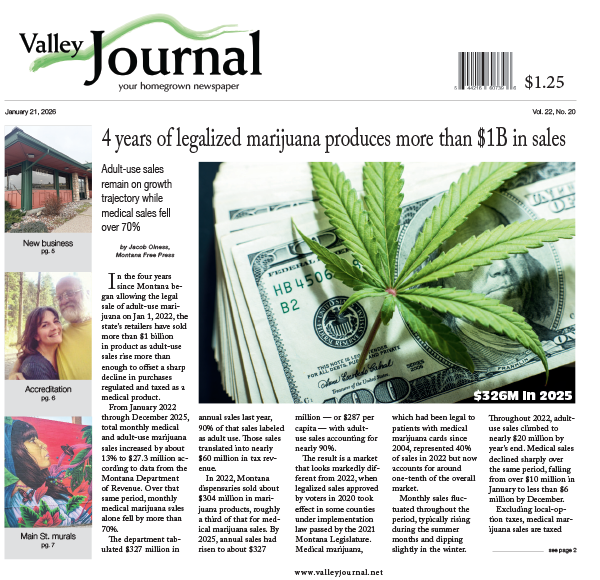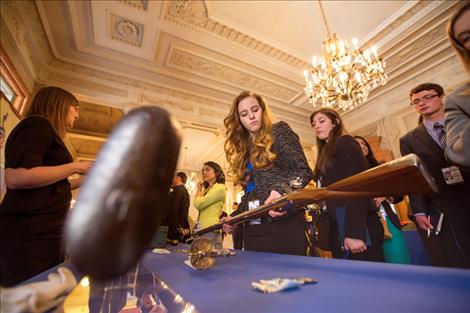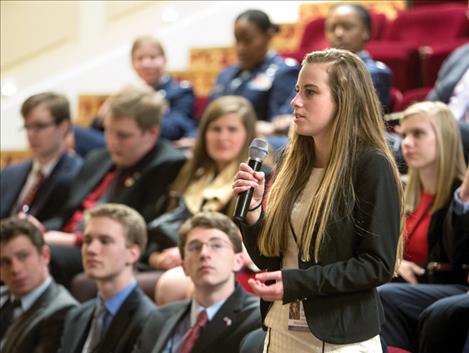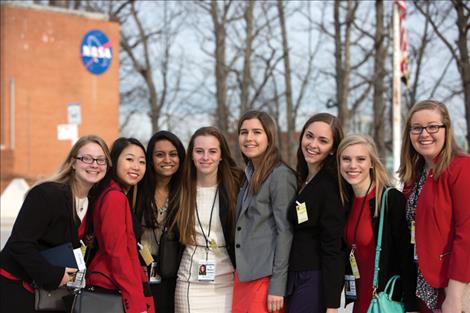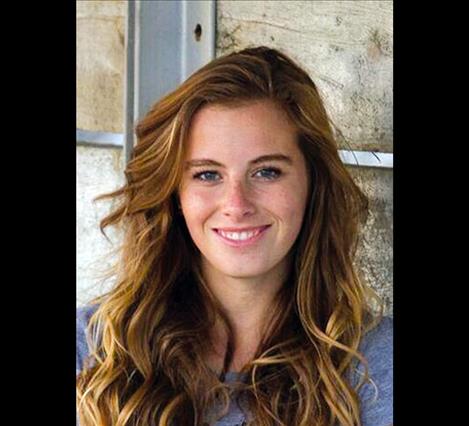Week inspires ‘drive to find out’
Hey savvy news reader! Thanks for choosing local.
You are now reading
1 of 3 free articles.
“You don’t know what is out there until you’ve stumbled across it,” said the parliamentarian of the Senate, a woman by the name of Elizabeth McDonough. Before traveling to Washington D.C. as a part of the United States Senate Youth Program, I didn’t even know enough to realize how true that statement was. In my mind, I pictured the east coast as it would be in the colonial era; think little men with white hair and fancy hats running around dumping tea in harbors and fighting the British. While the rich history still pervades the city, I only saw a few men dressed as such and not one of them was carrying around tea bags.
After getting over my disappointment that I wouldn’t be seeing any live action fighting, I began to soak in the experience. This program, in its 54th year and generously funded and supported by the Hearst Foundation, invites two students from each state, two from D.C. and two from military bases abroad to Washington D.C. for a week filled with speakers, tours, and even a night out at the national symphony.
Through the lens of a weary traveler, my first impression of D.C. involved 103 other delegates and alumni eagerly asking where I was going to college next year, then my name, and then what the rest of my life plans were. Needless to say, the initial meetings left me feeling slightly overwhelmed and exhausted, but excited. I was continually impressed by the merit and excellence of my fellow delegates, but being from a small Montana town without the opportunities that these students had, I felt like I didn’t quite measure up to their standard. It took about a day and a half for someone to dispel that notion.
After meeting and hearing from Former Judge Robert H. Henry, Supreme Court Justice Ruth Bader Ginsburg, the Secretary of the Senate Julie Adams, and the Parliamentarian, we settled down in the great ballroom for dinner, some three course extravagant meal that ruined my ability to eat like a normal American. After we had partaken of the meal, Senator Cory Gardner of Colorado spoke with us. He had been an alumnus of USSYP and eagerly extrapolated its praises and credits it with his decision to enter into civil service. After talking about his career and his policies, Gardner gave us some general life advice. One of his advisors had once told him to act like he belonged, and because of that misguided advice, he missed the opportunity to converse with one of his favorite actors. It was a mistake he didn’t repeat again, and he warned us against it as well.
“You don’t need to act like you belong because you do belong. You belong in D.C. You belong in your school. You belong in this nation, not as passive observers but as active participants who will solve these great challenges,” said Gardner.
It doesn’t matter where you attend college, or if you have your life goals laid out. Those things might help, but they didn’t make Gardner, Ginsburg, or even president Barack Obama, successful. What made the difference, what set them apart, was their dedication and their ability to focus on achieving goals.
After that first day, I stopped thinking it was a fluke I had been chosen for this program and began to actively seek out opportunities to grow and learn from the other delegates, speakers, and staff, especially the military mentors, who disseminated information, gave us guidance, and were all around amazing and intelligent people who turned out to be much different from the mean and strict image that I had about military personnel.
Tuesday morning, the third day of our week, we had the honor of meeting the president. After a long walk up the hill and multiple security checks, we were in the White House, which was actually a very impressive building. We waited with a degree of anticipation akin to the announcement of the next American Idol, and all of our eyes were trained on the door he was entering through. Every few minutes someone would make a joke about something and the buzz of conversation would begin, but inevitably we were told to stay quiet. Finally it was time, and our president, Barack Obama, walked through the doors. We began applauding, a resounding sound that filled the room we were in, and didn’t stop until he was standing in front of us. After a quick group photo, Obama started talking to us and even joked that he should replace the current congress with us because we would probably get more done. He was surprisingly normal for being the leader of the free world. Impressive, yes, but also a fellow human being who had struggles and hardships just like the rest of us. He advised us, as future leaders, to know what you want to do, not what you want to be, meaning not to strive for a position just for the power accompanied with it, but to have specific goals and ideas, something he is critical of in the current political climate.
Meeting Obama was a highlight of the week, but so was touring the NASA Goddard center and talking with the NASA administrator, hearing from the German Ambassador Peter Wittig at the Anderson House, visiting the Newseum, seeing many of the memorials and monuments, meeting the Montana senators, eating dinner in the National Archives, or even hearing the director of communications for USSYP, Mr. Steve Cox, tell us before each and every meal without fail, “Ladies and gentleman. Ladies and gentleman may I have your attention please. At this time the meal is served.”
I not only heard from some of the most powerful and inspirational leaders in America, but I connected with who I am sure will be the most powerful and inspirational leaders in America within the next few years: my fellow delegates. We bonded together over late night Justin Trudeau hunts (the attractive prime minister of Canada who was supposedly staying at our hotel), early breakfasts where we were too tired to be anything but honest, dinners where we shared ideas and laughs, and even our two dances, where inexplicably, 104 politically active teenagers found the ability to dance, which for some was a way bigger leap of courage than running for an office or interning for a senator. Recently, one of the South Carolina delegates said, “It was amazing to see how 104 teenagers with different backgrounds, culture, political ideologies, and race came together to share our stories and cordially debate politics,” and he couldn’t be more correct. We came from different states, different backgrounds, and had different viewpoints, but we became a family, and I guarantee we will cross paths a lot more in our mutual quests for world domination.
This week in D.C. proved that I still don’t know what is out there, but I have a drive to find out. Jonathan Capehart of the Washington Post told us to “be mindful your guardian angels,” and even in the short span that I was in D.C. I accrued more than one guardian angel, whether it was the people from the Hearst Foundation, our amazing photographer, the staff, military mentors, or the 103 other delegates. This program gave us a taste of our government and how politics work, but it also gave us a family of people who will help us succeed in whatever way they can, and to me, that was more invaluable than anything we saw or heard during our week in Washington D.C.















